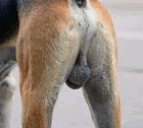
What Exactly Is This Odd and Oddly Named Condition? (Does neutering dogs cause cancer?) Rated PG!
Cryptorchidism is the scientific term for a condition in male dogs in which one or both testicles (testes) fail to descend into the scrotum, which is the pouch or sac that holds the testicles (in the case of neutered dogs, it shrinks over time and pretty much disappears). The condition affects approximately 1% – 3% of dogs and is probably inherited since it is commonly seen in families of dogs; however, the exact cause is not fully understood.
I know—its weird for me too to find myself writing and talking to people about the most “unusual” and sometimes ‘intimate’ subjects when it comes to dogs—but its my job—and I don’t mind doing it!!! So lets put it in plain English—we are talking about a dog with only one ‘nut’ or one that descends quicker than the other. And to PROVE this ‘one nut’ thing isn’t totally boring—did you know that the one side comes down first, then the other—and many times it’s the same side, same order, every time. But why does it matter to you, the pet owner, or, even more—the dog breeder or hobbyist?
Well, here’s the thing. I’ve been around dogs and the fancy for almost 35 years now and it never ceases to amaze me at how nature (flora and fauna) take care of themselves (or God does, if you are so inclined to think that way) and are unbeleiveably complex—sometimes predictable, and sometimes not. The science can always tell you the ‘averages’ but science can also MISINFORM when there is new research out and people are not getting the NEW SCIENCE. Therefore, myths and misconceptions can develop that actually end up hurting our beloved pets in the end.
FICTION: Neutering will prevent testicular cancer
FACT: What research has been done?
In 2013, vets at the University of California examined the records of 769 Golden Retrievers (3). Their aim was to establish if there was a link between neutering and cancer. They concluded that neutering increased the risk of 3 types of cancer that occur in the dog (haemangiosarcoma, lymphoma and mast cell tumours). The results were complicated by gender and the timing of neutering. For example, early neutering (before 12 months) increased the risk of lymphoma more in male dogs than in female dogs. Whereas haemangiosarcoma occurred more often in late neutered females than in early neutered females, entire or neutered male dogs.
These results were then compared with a study in Labrador Retrievers(4). The authors’ found that neutering affected cancer risk far less in Labradors. (This is why I wanted to include this article as it pertains to LABRADORS!)
An internet study surveying Vizla owners (5) suggested that neutered dogs had a higher incidence of mast cell tumours, lymphoma and haemangiosarcoma (females only) –Vethelpdirect.com,
Sian Tranter MA VetMB CertAVP MRCVS
I won’t bore you with links—but you can so easily research this subject on the internet.
So what? I just have a pet—aren’t I supposed to neuter it anyway? Well…according to the latest research, some of which can be found in Early Spay/Neuter and the canine Athlete, shows how just the opposite is true (when we are not talking animal population control, of course).
Fiction: An undescended testicle will not descend.
Fact: I’ve only seen one or two not descend, and without harm to the dog, that were removed (from inside the body cavity) when/if a regular neuter was performed, as some believe that leaving the testicle in the body cavity for years and years could cause cancer. -“One of the most common risks of undescended testicle in dogs is the increased risk of testicular cancer if the undescended testicle is not removed. Some vets and breeders feel that cryptorchidism may negatively affect a dog’s personality. Some dogs may develop hormonal or endocrine problems due to undescended testicle, and may not grow or develop normally. Undescended testicles may not produce much sperm, and if cryptorchidism affects both of your dog’s testicles, he may be entirely sterile (Vetinfo.com).”
I will comment, as a breeder, I have seen dogs with undescended testicles test out as having the full amount of sperm count as any dog,and can reproduce normally. But since we cannot include our research to include the dogs in the wild left un-neutered with an undescended testicle, we have an incomplete test group to really draw final conclusions with. But you will find a trend in the studies if you choose to research further.
In general, if looking for a breeding dog, it is common to be sure the testicles are descended—and if you show your dog in AKC conformation—the judge will check that too, to be sure!! (Oh how glamourous! And you thought dog judging was all glitz and glamour!)
As breeders, we actually record occurances of undescended testicles just so we don’t see it as something re-occuring genetic. It is normal of it to happen occasionally. And usually its noted about six weeks of age at a vet exam—then when re-examined at 8 weeks, we already find it in fact, did decend. If it has not, we note it on the health record, so that when and if neutering is done, we help pay the extra small fee for “fetching that hiding guy” in the body cavity.” No big deal.
Have I EVER seen cancer in a testicle in 35 years? Not to my knowledge!
For more info on neutering your dog or about other forms of non-invasive sterilization, click here.


